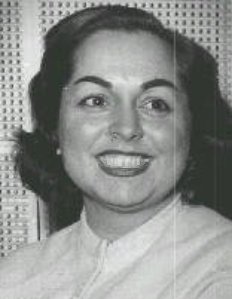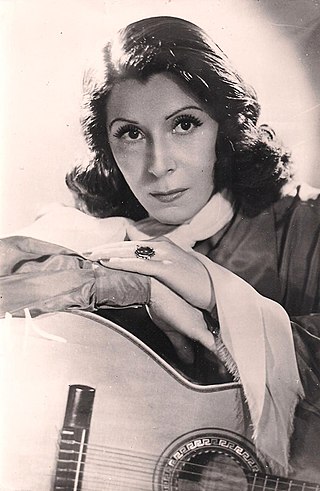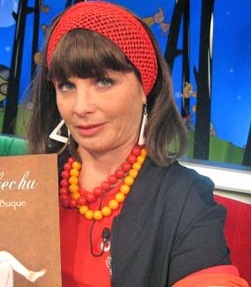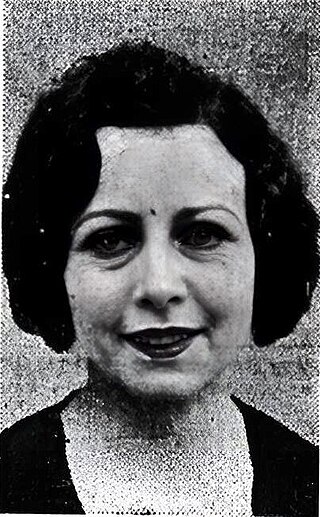Related Research Articles

Libertad Lamarque Bouza was an Argentine-Mexican actress and singer, one of the icons of the Golden Age of Argentine and Mexican cinema. She achieved fame throughout Latin America, and became known as "La Novia de América". By the time she died in 2000, she had appeared in 65 films and six telenovelas, had recorded over 800 songs and had made innumerable theatrical appearances.

Soledad "La Sole" Pastorutti is an Argentine folk singer, who brought the genre to the younger generations at the end of the 20th century, and the beginning of the 21st.

María Amelia Baltar, better known as Amelita Baltar, is an Argentine singer, one of the leading voices of tango, that appeared in the 60's to be considered, along with Susana Rinaldi, as a modern counterpart of older divas such as Libertad Lamarque and Tita Merello. She is mostly known for her collaboration with composer Astor Piazzolla and writer Horacio Ferrer, specially as first performer of their song “Balada para un loco”. She starred in places such as Olympia (Paris), De Kleine Komedie (Amsterdam), Cemal Reşit Rey Concert Hall, Cocoanut Grove at Ambassador Hotel or Ginásio do Maracanãzinho and shared the stage with celebrities such as Charles Aznavour, Franck Pourcel, Henry Mancini, Gerry Mulligan, Gary Burton and Chick Corea.

Laura Ana "Tita" Merello was an Argentine film actress, tango dancer and singer of the Golden Age of Argentine Cinema (1940–1960). In her six decades in Argentine entertainment, at the time of her death, she had filmed over thirty movies, premiered twenty plays, had nine television appearances, completed three radio series and had had countless appearances in print media. She was one of the singers who emerged in the 1920s along with Azucena Maizani, Libertad Lamarque, Ada Falcón, and Rosita Quiroga, who created the female voices of tango. She was primarily remembered for the songs "Se dice de mí" and "La milonga y yo".

Ada Cornaro was a prominent Argentine film and theatre actress, tango dancer and singer of the 1930s and 1940s.

Susana Calandrelli was an Argentine writer and teacher.

Rosita Quintana was an Argentine-Mexican actress, singer and songwriter. She was one of the top leading ladies of the Golden Age of Mexican cinema. She starred in Luis Buñuel's Susana (1951) and musical films such as Serenata en México (1956) and Cuando México canta (1958). Her performances earned her acting awards from Mexico, Argentina, Russia, and Spain. In 2016, she received the Mexican Academy of Film Arts and Sciences' Golden Ariel Award for career achievement.

Nélida Dodó López Valverde known professionally as Nelly Beltrán was an Argentine actress. She appeared on the radio from the age of 10 and in 85 theatrical performances, 48 films and 3 dozen television shows between 1953 and 1996. She won a Martín Fierro Award as Best Comic Actress for her television work on La hermana San Sulpicio; participated in the film Pajarito Gómez which won the Best Youth Film award at the 15th Berlin International Film Festival; won a Konex Foundation Award; and was honored by the Argentina Actors Association in 2004 for her career contributions.
Nicole Nau is a German dancer of Tango Argentino and Argentine folklore living in Argentina and Germany.

Gran Casino is a 1947 Mexican film. It was written by Mauricio Magdaleno and Edmundo Baez, based on a story by Michel Weber, and directed by Luis Buñuel.

Nilda Elvira Vattuone, better known by her stage name Nelly Omar, was an Argentine actress and singer during the Golden Age of Argentine Cinema. She was successful as a tango singer, performing on numerous radio shows and performed canción criolla. Her film career began in 1940. She was blacklisted after the ouster of Juan Perón for having sung his anthem, Soy La Descamisada and did not work again until the 1970s. From her comeback in 1972, she remained an active performer until her death.
Olinda Bozán was an Argentine film actress and comedian of the Golden Age of Argentine Cinema (1940–1960). Born into a circus family, she acted on the vaudeville circuit, and performed in silent and sound movies. She was trained by the Podestá brothers, one of whom she married, who have one of the most prestigious Argentine acting awards named for them. Bozán' appeared in 75 films and was considered one of the best comic actors of Argentine cinema in the 20th century.

Azucena Maizani was an Argentine tango singer, composer and actress who was born in Buenos Aires on November 17, 1902 and died in the same city on January 15, 1970. She was discovered in 1920 by Francisco Canaro and quickly emerged as a major star. Her frequent appearances on stage and radio made her the female counterpart of Carlos Gardel although she did not enjoy as successful a film career as he did, appearing in a handful of films including Buenos Aires Sings (1947). During many years she gave performances dressed with men's suits or criollo cowboy attire for which she was known by the nickname "Funny-face Cowgirl", given to her by Libertad Lamarque in 1935.

Mariana Marcela Briski was an Argentine actress, director, producer, screenwriter, author, and professor. She was known for her roles in It's Not You, It's Me (2004), The Wind (2005), and Salsipuedes (2011). Briski was also known for her television roles in Primicias and Poné a Francella.

María Elena Lucena Arcuri was an Argentine film actress of the Golden Age of Argentine Cinema (1940–60). She began her career in radio in the 1930s and reached her greatest success with the role of "Chimbela", which was later depicted in film, theater and television. Her extensive film career includes approximately 50 films, including notable performances in Chimbela (1939) and Una noche cualquiera (1951). During the 1940s, she participated in films with comedians like Pepe Arias, Pepe Iglesias "El Zorro", Niní Gambier, Mirtha Legrand and Carlos Estrada. Her most acclaimed film work occurred in Elvira Fernández, vendedora de tienda (1942) by Manuel Romero, Cinco besos by Luis Saslavsky and La Rubia Mireya for which she received the 1948 Best Comedy Actress Award from the Argentine Film Critics Association.
Cora María Bertolé de Cané, better known as Cora Cané, was an Argentine journalist, librettist, and writer. Beginning in 1957, she wrote a section for the Argentine newspaper Clarín towards the end of each issue called Clarín Porteño, previously known as Notas del Amanecer, the oldest portion of the newspaper. She would write this section until her death in 2016.
Claudia Roxana Castrosín Verdú, also known as Claudia Castro, is an Argentine LGBT activist. She presides over La Fulana, an organization that supports lesbian and bisexual women, and is also the vice president of the Argentine Lesbian, Gay, Bisexual, and Trans Federation (FALGBT), through which she has contributed to laws sanctioning same-sex marriage, gender identity, and medically assisted reproduction. In 2007 she presented, together with María Rachid, her partner at the time, the first judicial protection for declaring the unconstitutionality of two articles of the civil code that prevented marriage between people of the same sex. After the approval of the Equal Marriage Law in 2010, she married Flavia Massenzio and adopted a daughter, Estefanía.
Susana Viau was an Argentine journalist, writer, and political columnist with extensive experience in graphic media in her country.

Vivir es hoy is a studio album by the Argentine singer Soledad Pastorutti, released by Sony Music on 10 March 2015. The album is a fusion of Latin pop and Latin folk, produced by Gian Marco and Matías Zapata, and recorded in Buenos Aires and Los Angeles.

Anita Bobasso was an Argentine actress and tango singer who worked throughout the Americas and Europe, especially in Brazil, where she was well known, including works in radio broadcasting, theater and cinema. The musical shows in which she participated used everything from typical costumes to informal and elegant dances. Bobasso also performed a world tour with Libertad Lamarque and Azucena Maizani.
References
- ↑ «Guía quincenal de la actividad intelectual y artística argentina» (volumen 4).
- ↑ Según su currículum vítae, en 1949 tenía 17 años.
- 1 2 «Currículum vítae», en el sitio web de Susana Naidich.
- 1 2 «Entrevista exclusiva a Susana Naidich: “Un cantante no puede emitir con libertad si está pensando en su onda sonora”, artículo de Soledad Sacheri en el sitio web de la Sociedad Argentina de la Voz.
- 1 2 3 «Susana Naidich, personalidad destacada», artículo en el diario DBA Noticias, de junio de 2011.
- ↑ «Acerca de los músicos judíos exiliados en la Argentina durante el nazismo.
- 1 2 3 4 5 6 «Susana Naidich, personalidad destacada de la Cultura», artículo en el Diario Z del 14 de junio de 2011.
- ↑ «Veinte años de la muerte de Eduardo Rovira, el otro Piazzolla», artículo de Julio Nudler en el diario Página/12 del 23 de julio de 2000.
- 1 2 «Canciones entre madre e hija.
- ↑ Comentario de Julio Bernaldo de Quirós al libro Principios de foniatría.
- 1 2 3 4 5 6 7 8 9 «Susana Naidich: Homenaje de la Legislatura Porteña», video en el sitio web Facebook, sin fecha ni autor.
- ↑ «¡Atajate que se viene el minaje en formación!», artículo de María Moreno en el suplemento «Las 12» del diario Página/12 del 5 de mayo de 2000.
- ↑ «Libertad Lamarque: “Dije no a la ópera y a Hollywood”» Archived 2016-08-09 at the Wayback Machine , artículo del 11 de agosto de 1996 en el sitio web La Música.
- ↑ «Soledad Pastorutti: “La gente sigue valorando que sea una niña”», artículo en el diario Río Negro del 26 de noviembre de 2008.